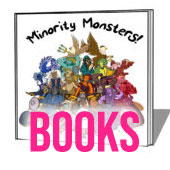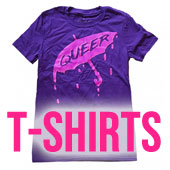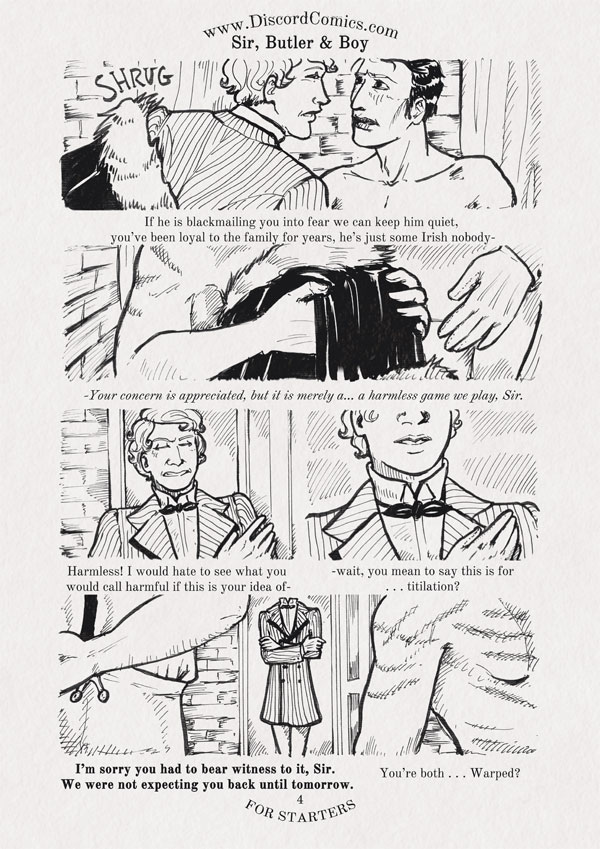Sir, Butler and Boy ~ For Starters ~ Page 4
This page wins the prize for the most rewrites I’ve ever done. I’m attempting to get the victorian phrasing down properly, which means stripping all the contractions (weren’t and you’d) out and trying to research what words a late victorian would use to describe ‘sadomasochistic homosexual’. I almost used Invert instead of Warped, but turns out that didn’t come into use until after 1930. Homosexuality wasn’t considered a medical disease before then, despite sodomy being illegal and it being possible to be charged for ‘indecency
















“titilaltion” ? Is it a typing mistake ?
I don’t comment a lot on your last work, but I like the change, and the background work is amazing, you improved your art a LOT since the beginning, it’s fill with depth and perpectives :) Thanx a lot for keeping us hooked !
Fixed!
I like how Jefferson takes up his service duty even as he’s explaining what’s going on. The guy is naked, and here he’s all “I’ll take your coat, sir.” I can’t wait to see how this goes from “You’re both . . . Warped?” to “Can I join you?”
Ha! It was more that James was giving him his coat to help cover his naked, welt covered body?
That’s how I read it too, but I like A’s interpretation nonetheless xDD
Ah. I misread intent there. Though I do notice that Jefferson did not actually don the coat he accepted from James. That’s what gave me the impression he was taking his service duty so seriously.
It looks a little small for him to actually wear it- I think it would be like a reverse hospital gown situation. Theoretically clothed but still exposed.
…Well, Tab, if you ever wanted to give us a random sexy picture of Jefferson… I think you got an idea right there 8D
I think I’m gonna cry! I love seeing the boy so caring like this. It was said before but how he is to Jefferson could be seen as either playful or malicious, but I love seeing how he wants to protect him and how it shows he cares. Seeing Boy swoop in like this and be so protective and I just… *sheds tears of pure love* Thank you for sharing your characters with the world Tab, all of them
Though watching James stand up to John must be like watching a cocker spaniel yap at a very sorry looking alsatian.
While I certainly understand the struggle to get Victorian speech right – especially the vocabulary – when it comes to contractions, they were used in that time as well. While they didn’t show up as much in the writing, people still spoke using contractions then. So, if you’re not trying to make it read like Victorian writing but rather you’re just trying for accuracy in the speech, you can relax a little on those.
http://www.todayifoundout.com/index.php/2014/11/origins-english-contractions/
Interesting! The article uses Mark Twain as an example though- is it possible it’s more Amercian-centric?
I’d assume James probably speaks real fancy and might not use contractions, but lower class people like John would use them a lot. Unless he’s trying to sound fancy as well, of course. *imagines John doing a posh person impersonation and giggles*
I suspect they use Twain simply because he’s so well known in general and particularly for writing speech to look more like the way people talked. However, there are plenty of examples of contractions going back to Old English and even more recently though older than this piece in Shakespeare (http://historicallyirrelevant.com/post/3505130893/the-history-of-contractions)
It seems that at some point, someone (or more likely many someones) decided that, despite their common usage in spoken language that proper writing simply shouldn’t have contractions, leading many to think they didn’t exist in those times.
I was just looking through my copy of Alice in Wonderland, and almost all the characters use contractions in that (not just Alice, who’s a child). The interesting thing is that the spellings apparently hadn’t been standardized back then and you’ll sometimes see two apostrophes instead of one. For example: ca’n’t. It’s interesting how printing is different only a short time back…
The fact that there is a linguistics/grammar discussion on a graphic-novel-smut site is highly amusing to me.
What can I say, language and grammar get me as hot and bothered and kinky, queer smut xD
LOL Yeah, I’ve been enjoying the language/grammar discussion, even though I don’t have any input.
“We can keep him quiet; you’ve been loyal to the family for years, he’s just some Irish nobody!”
I nearly choked on my tea.
Though that might not be the best thing to say when you’ve just turned your back on what you think is a burly, half-naked blackmailing pervert.
I can’t wait to see how this, ahaha, comes out.
Being as pampered as he is, James probably has little to no experience with the fact that burly, half-naked blackmailing perverts can punch you in the mouth even if they’re under your employ.
(Also, ‘choked on my tea’ is the most appropriate reaction to these comics, ever.)
Why bother trying to get the language perfect if you’re not even trying to make the social situation or household arrangements believable? (How the hell were they alone in the house? Before the existence of modern household appliances, a house that size would need at least half a dozen servants to clean and look after. And a butler would most certainly NOT do the dirty jobs like cleaning, fire stoking, cooking, etc. WAY beneath his pay grade. That’s what maids are for. Or at least a female housekeeper, if it’s a small middle class household with the maids just coming in for the day and the washing being sent out to a laudress.)
Also, “uranian / uranistic” or “you’re mollies?” would probably have worked for period-appropriate terms. I mean, those are both terms that are somewhat associated with femininity and cross-dressing, but it’s not unusual for clueless guys to insult gay men as girly even in our day and age, after all. “Pansy” or “shirt lifter” may have been around long enough (at least I’ve heard those terms used in Victorian period TV dramas). “Queer” as a slur directed against gay men has been around since the late 19th century – it’s only been embraced and reclaimed very recently. (So recently that I still avoid refering to mixed groups of LGBTQIA people with the more handy catch-all term “queer” if I know that middle-aged cis gay men are in the group or audience.) And “sodomite” is in the King James Bible, so an upper class English man of any period after Shakespeare would certainly be familiar with the term.
I’ve never heard or read the word “warped” used in this context before.
“Pathic” is also nice, if you want to sound all educated and polite. But it means exclusively “passive bottom” – basically the same meaning as with “catamite” but less emphasis on the youth of the boy and instead with added masochistic vibes. (It derives from the Greek word for “suffering” – just like in “pathos” or “pathetic”.) Still, it’s been in use at least since Lord Byron’s time.